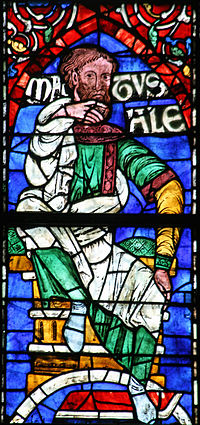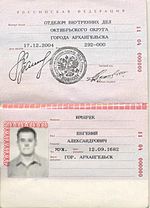Chinese characters for transcribing Slavonic were Chinese characters created for the purpose of transcribing Slavonic sounds into Chinese. The Russian...
10 KB (365 words) - 16:57, 10 June 2024
Albazinians Oros Niru Amur Cossacks Harbin Russians Chinese characters for transcribing Slavonic "REGIONS.RU — новости Федерации | Митрополит Иларион о православии...
15 KB (1,482 words) - 23:15, 20 October 2024
of Glagolitic manuscripts Old Church Slavonic Chinese characters for transcribing Slavonic Old Church Slavonic: црькъвьнословѣньскъ ѩзыкъ,...
26 KB (2,803 words) - 10:44, 17 November 2024
names in China Chinese exonyms Chinese characters for transcribing Slavonic, for transcription from Church Slavonic Jingtang Jiaoyu, for transcribing Arabic...
67 KB (5,609 words) - 23:31, 9 November 2024
Chinese characters are generally logographs, but can be further categorized based on the manner of their creation or derivation. Some characters may be...
46 KB (4,547 words) - 01:33, 19 November 2024
Chinese characters are logographs used to write the Chinese languages and others from regions historically influenced by Chinese culture. Chinese characters...
121 KB (14,141 words) - 02:39, 19 November 2024
Chữ Nôm (redirect from Chinese characters in Vietnamese)
uses Chinese characters to represent Sino-Vietnamese vocabulary and some native Vietnamese words, with other words represented by new characters created...
67 KB (7,208 words) - 05:13, 2 November 2024
Hanja (category Writing systems using Chinese characters)
as Hancha, are Chinese characters used to write the Korean language. After characters were introduced to Korea to write Literary Chinese, they were adapted...
49 KB (5,785 words) - 09:33, 16 November 2024
of Korea and was used to transcribe the Korean language in Chinese characters. Using the hyangchal system, Chinese characters were given a Korean reading...
2 KB (198 words) - 19:50, 25 September 2024
from Chinese using their original characters, representing words with characters for similar-sounding Chinese words, representing words with characters for...
24 KB (2,802 words) - 01:21, 19 November 2024
Seal script (redirect from Seal characters)
Seal script or sigillary script is a style of writing Chinese characters that was common throughout the latter half of the 1st millennium BC. It evolved...
8 KB (866 words) - 18:01, 8 August 2024
and after vowels) for transcribing the foreign vowels /ø/ or /œ/, and also for French labialized schwa: "de" and "le" are transcribed де and ле in Russian...
19 KB (2,143 words) - 19:11, 12 October 2024
History of writing in Vietnam (category Writing systems using Chinese characters)
ngôn (Classical Chinese) using chữ Hán (Chinese characters), and then also Nôm (Chinese and original Vietnamese characters adapted for vernacular Vietnamese)...
51 KB (6,515 words) - 01:01, 7 November 2024
Semitic languages, Elamite, Hittite, Luwian, Hurrian, and Urartian Chinese characters – Chinese, Japanese (called Kanji), Korean (called Hanja), Vietnamese (called...
51 KB (3,393 words) - 22:29, 12 November 2024
Calligraphy (category CS1 uses Chinese-language script (zh))
Study — ink brushes known as máobǐ (毛筆/毛笔), Chinese ink, paper, and inkstones — to write Chinese characters. These instruments of writing are also known...
56 KB (6,118 words) - 12:02, 9 November 2024
mainland is limited. Bopomofo developed from a form of Chinese shorthand based on Chinese characters in the early 1900s and has elements of both an alphabet...
59 KB (6,716 words) - 14:21, 13 November 2024
Liding (category CS1 uses Chinese-language script (zh))
(202 BC – 220 AD), the clerical script reached its matured form, in which Chinese characters became largely rectilinear and readily segmented into strokes. The...
21 KB (1,789 words) - 20:51, 15 May 2024
the case of B.P. Hasdeŭ. When transcribing Malayalam texts into ISO 15919, usually the final glottal-stop is transcribed as 'ŭ', an epenthetic vowel (a...
8 KB (854 words) - 07:45, 19 August 2024
described in further detail in other texts such as the Book of Enoch, Slavonic Enoch, and the Book of Moses. Bible commentators have offered various explanations...
29 KB (3,593 words) - 01:47, 11 November 2024
Sino-Xenic vocabularies (category Writing systems using Chinese characters)
the Chinese script to write their languages, using Chinese characters both for borrowed and native vocabulary. Thus, in the Japanese script, Chinese characters...
32 KB (2,592 words) - 04:09, 28 August 2024
Y (section Related characters)
language Church Slavonic. Ү ү : Cyrillic letter Ue (or straight U) Ұ ұ : Kazakh Short U ¥ : Yen sign ⓨ : In Japan, ⓨ is a symbol used for resale price maintenance...
34 KB (3,240 words) - 20:02, 12 November 2024
Cherubikon (section Old Slavonic Cherubim Chant)
χερουβικόν) is the usual Cherubic Hymn (Greek: χερουβικὸς ὕμνος, Church Slavonic Херуви́мская песнь) sung at the Great Entrance of the Byzantine liturgy...
42 KB (4,176 words) - 18:15, 17 October 2024
List of Latin-script letters (section Other characters)
Unicode request for two BMP Latin characters" (PDF). Everson, Michael (2019-04-25). "L2/19-180R: Proposal to add two characters for Middle Scots to the...
194 KB (1,131 words) - 01:27, 17 November 2024
This article contains special characters. Without proper rendering support, you may see question marks, boxes, or other symbols. The Bulgarian Cyrillic...
27 KB (1,750 words) - 10:11, 13 November 2024
Kontakion (redirect from Kontakion for the Departed)
kontakia is called a kontakarion (κοντακάριον; loaned into Slavonic as kondakar, Church Slavonic: кондакарь), but a kontakarion is not just a collection...
33 KB (3,695 words) - 06:36, 4 November 2024
the pre-reform Russian orthography, in Old East Slavic and in Old Church Slavonic the letter is called yer. Historically, the "hard sign" takes the place...
103 KB (4,940 words) - 13:39, 4 November 2024
Musical notation (section China)
notation contains 64 characters (characters representing musical notes), written in groups of four notes. The basic characters for the seven notes, 'sa...
67 KB (8,309 words) - 04:42, 14 November 2024
Eastern Slavic naming customs (redirect from Eastern Slavonic naming customs)
use of diminutive forms is optional even between close friends, in East Slavonic languages, such forms are obligatory in certain contexts because of the...
51 KB (3,500 words) - 18:20, 16 November 2024
Romanization (section Chinese)
scientific transliteration is used for both Cyrillic and Glagolitic alphabets. This applies to Old Church Slavonic, as well as modern Slavic languages...
59 KB (4,071 words) - 12:14, 29 October 2024
Khazars (category Articles containing Church Slavonic-language text)
Slavic: коꙁаре, romanized: kozare; Church Slavonic: коꙁари, romanized: kozari; Latin: Gazari, or Gasani; Chinese: 突厥曷薩 Tūjué Hésà; 突厥可薩 Tūjué Kěsà, lit. 'Türk...
218 KB (25,563 words) - 20:18, 9 November 2024























